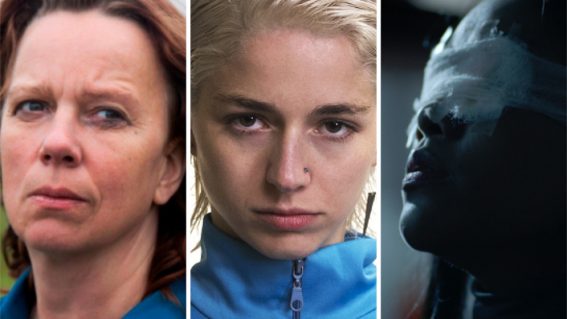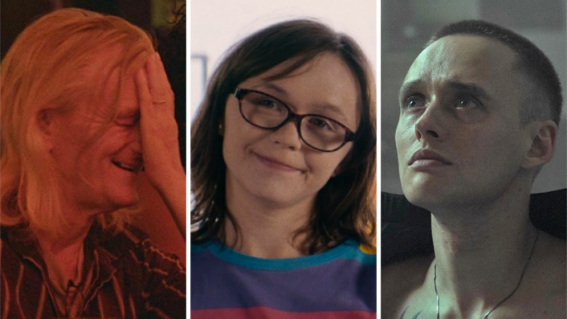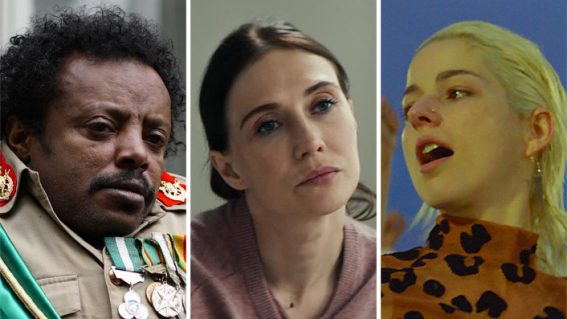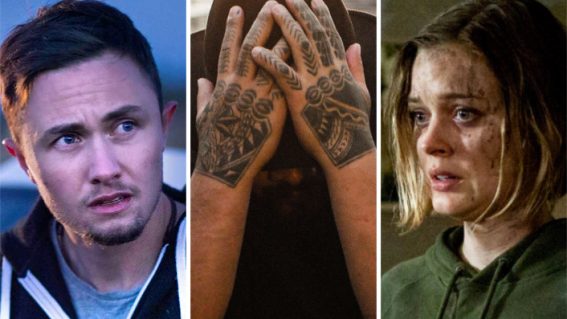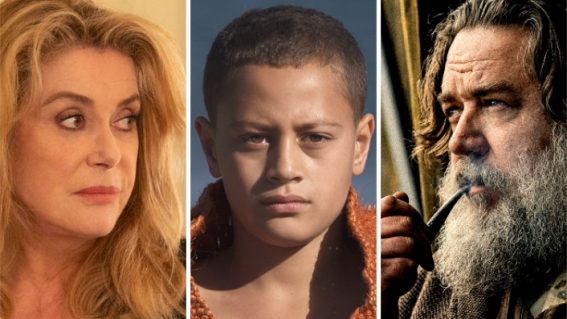NZIFF 2020 mini-reviews (K – M)
Our Whānau Mārama: New Zealand International Film Festival mini-reviews.
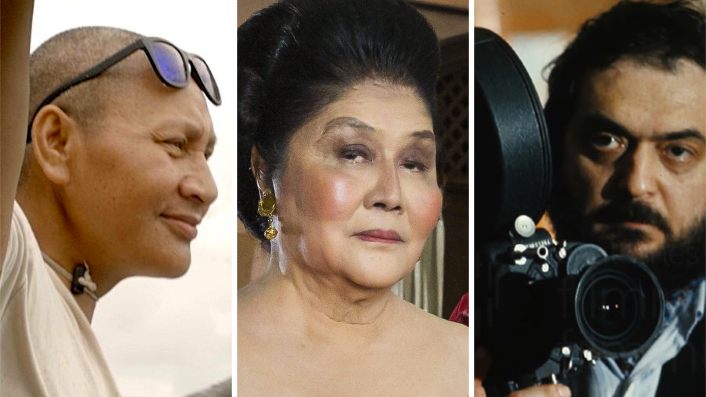
Our writers have been watching a ton of films playing as part of Whānau Mārama: New Zealand International Film Festival 2020.
This year’s festival, streaming online (and playing in select cinemas), from 24 July to 3 August features plenty of gems. Our team of keen viewers has gotten an early look at much of the programming, and we’re here to help make your picks for 2020. We’ve alphabetised our reviews here for your convenience.
All 2020 mini-reviews:
Latest reviews | A – D | E – J | K – M | N – R | S – Z
See also:
* All our Q&As with this year’s filmmakers
* Steve Newall’s early picks from the programme
* Liam Maguren’s early picks from the programme
King of the Cruise
Following attention-hungry (and just generally hungry) Scottish baron Ronald Busch on one of his frequent luxury cruises, King of the Cruise paints a poignant picture of a man addicted to indulgence. But while Ronald certainly thinks he’s the most interesting man alive, I wasn’t so sure—and wished filmmaker Sophie Dros had expanded her scope to some of the ship’s other passengers (and incredibly patient staff) to better examine just what is so attractive about such this unbearably artificial environment.
KATIE PARKER
Lent further oddness by watching mid-pandemic (will cruise ships and their aged clientele come out the other side of Covid-19 the same?) Sophie Dros’s slender 74 minute doco sits slightly removed from the onboard experience, lending it a slight otherworldliness. Her privileged blowhard subject of the title, meanwhile, elicits many emotions, running the gamut from amusement to sadness and contempt.
STEVE NEWALL
The Kingmaker
For the first 15 minutes or so of The Kingmaker, it seems as though it is going to be much the same deal as director Lauren Greenfeld’s previous and best-known feature, The Queen of Versailles: a bemused study of a silly yet sad woman with too much money and not much understanding of where it came from. But as it unfolds, this stunning documentary about the past and present of the notorious former first lady of the Philippines, Imelda Marcos, masterfully reveals just how sinister Marcos’s flamboyantly feigned ignorance really is—and paints a stunning and searing portrait of a woman who knows exactly what she’s doing and, chillingly, exactly what she’s done. A masterpiece!
KATIE PARKER
“Perception is real, the truth is not.” Quotes “Meldy” from her strangely immovable face and there is no doubt she actively indulges this plainly nuts mantra to shape her brand. She is wincingly and unapologetically garish and what appears at the beginning to be a wryly humorous (in its observation of her excessive ways and emotionally detached benevolence) documentary portrait of the once exiled, former First Lady of the Philippines, slow burns into a terrifying exploration of the Marcos’ flagrantly corrupt and brutal dictatorship. Sobering, excellently assembled commentary on the making of monsters.
SARAH VOON
First seen doling out cash through her vehicle window to a streetside throng, and then soon after calling for her assistant to pass a wad of money she can “benevolently” be filmed giving it to kids in a hospital ward, the early optics of this Imelda Marcos portrait are darkly hilarious and horrifying. The latter feeling grows over the course of this doco—that yes, mentions shoes— but also charts the historically huge plundering of a nation, an utterly terrifying depiction of a brand of vile autocracy and populism still alive in the Philippines and on the rise worldwide. Perhaps the doco of the fest.
STEVE NEWALL
Think Imelda Marcos and you probably think shoes, and though her collection numbering in the thousands gets a cursory mention here, there’s so much more to the story of the former Philippines first lady who once strode the world stage like a glamorous yet terrifying Princess. There’s fun to be had wallowing in the madness of it all, the tacky baubles, the wild spending, including herds of African animals and New York apartment buildings. Then there’s Imelda’s jaw-dropping lack of self-reflection and a Trump-like persecution complex. But the painful history soon unfolds into a living nightmare of the now. Don’t miss it.
PAUL CASSERLY
Kubrick by Kubrick
Good nugget of film knowledge centred on one of the only audio interviews Stanley Kubrick gave a shit about, stylishly assisted with visions of 2001‘s white room housing his career. In a field where artists can get too pretentious about their work, Kubrick’s matter-of-fact perspective on his films and processes feels damn refreshing. Doesn’t delve too deep to be groundbreaking, but I get the feeling that’s Kubrick would’ve wanted it that way.
LIAM MAGUREN
Less boom and more a bust for Kubrick nuts, Gregory Monro’s documentary plays more like a radio show of taped interviews, albeit illustrated with a quaint model of Bowman’s alien hotel suite from 2001: A Space Odyssey. Fine for fresh Kubrick nerds, but offering nothing new, this adds little to the Kubrick canon and is starved of the great visuals the master filmmaker is so celebrated for.
ADAM FRESCO
Last and First Men
It was a pleasure succumbing to the powers of Jóhann Jóhannsson’s sparse and meditative film, even while chilled by the wind it whips through the structures of humanity’s (future?) past. Precise, slow, black and white camerawork recontextualises buzzy European WWII memorials, Tilda Swinton’s monologue epitaph drifts back millions of years to the present, and Jóhannsson’s typically unsettling, moving score all challenge one another, sometimes cohering and at others not so much in what’s still a very memorable experience. RIP.
STEVE NEWALL
The only film by late, great Icelandic composer Jóhann Jóhannsson is an icy, stark blast of meditative science fiction and architectural essay. Casting an epic reach even at a svelte 70 minutes, the film feels like a complete statement, carrying the weight of an entire body of work behind it. Pregnant with doom and a transporting stillness, its vast empty spaces and immovable monuments—scored to Jóhannsson’s searching score—hint at limitless potential for humanity.
AARON YAP
Could’ve happily immersed myself in the incredible otherworldly architectural imagery and Jòhan Jòhansonn‘s epically eerie score by themselves for 70min. However, with Tilda Swinton constantly telling me to visualise a furry translucent superhuman society as well, my attention felt like it was being pulled between two experiences that never fully connected with each other.
LIAM MAGUREN
Late Icelandic composer Johann Johannsson’s film is a stark modern art meditation on the extinction of our species. Inspired by Olaf Stapledon’s sci-fi story, and narrated by Tilda Swinton, this is a moving, mesmeric poem told in minimalist imagery, devoid of people, and largely featuring modernist concrete architecture, accompanied by a haunting score. An experience rather than familiar cinematic entertainment, recalling past masterworks La Jetée and Koyaanisqatsi, that had me enraptured throughout its seventy-minutes.
ADAM FRESCO
The Last Wave
Peter Weir’s 1977 follow up to Picnic at Hanging Rock is a fittingly sombre supernatural mystery about race and identity in Australia. Anchored by a stunningly tense performance from David Gulpilil, The Last Wave is not afraid to get uncomfortable and positively relishes getting weird. Ancient Aliens as psychological thriller, only the real villain is settler colonialism.
AMELIA BERRY
Leap of Faith: William Friedkin on The Exorcist
Chock-full of scarily good insights, Alexandre Philippe’s fascinating documentary centres on an interview with director William Friedkin. Liberally illustrated with The Exorcist, plus scenes featuring Linda Blair’s original voice, before actress Mercedes McCambridge dubbed in the demon, with the aid of cigarettes, alcohol, and two priest pals. Open, frank, arrogant, and engaging, Friedkin discusses his art, film, and musical influences, throwing in tales of how he punched a bona fide priest to get a great performance and coaxed a reluctant Max von Sydow into raging against a demon. Sheer cinephile catnip.
ADAM FRESCO
LOIMATA, The Sweetest Tears
Don’t think I deserved to be blessed with something this incredibly intimate and full of wisdom. As powerful as 2018’s Māui’s Hook, Anna Marbrook uses cinematic sensitivity to capture one whānau’s exemplary examination of past abuse. Surprisingly laughed a lot too due to the extraordinary Ema and her family’s sense of humour—a reflection of their warmth, openness, and sharp perspectives of the world.
LIAM MAGUREN
The Long Walk
My favourite of the fest so far is shrouded in mystery and drenched in portent, the tale of an old man, a young boy, and the woman who connects them. To say more would ruin the fun, but suffice it to say there are subtle sci-fi elements and a twisty plot—one that might seem impenetrable at first but is well worth sticking with, tying things up in a way that’s satisfying and profound.
TONY STAMP
Futuristic forearm microchip tech contrasts intriguingly with the remote rural Laotian village setting and nondescript 21st Century clothing of the locals. In turn, a ghostly, sad, sultry, unsettling time-bender of a film—confusing in much the same way German TV drama Dark can be, with hints of “I see dead people”… The brain gets a workout, and it’s highly entertaining—win win.
SARAH VOON
Very cool to see a depiction of a future Laos that doesn’t exaggerate technology, though the small budget does strain to maintain the illusion. While there are tried-and-true time-travel tropes here, the spiritual angle takes the genre to a new, welcomed, thought-provoking, existentially creepy place. I’m thankful to the slow pace for giving my brain enough time to piece everything together.
LIAM MAGUREN
Woozy, contemplative brew of Apichatpong-style forest ghosts, temporal loopiness, fleshy microchip tech and herbal tea mercy-killing. A spooky, slippery, conceptually bold stunner, steeped in the lingering ache of death and memory. Likely to be one of the year’s most memorable NZIFF discoveries.
AARON YAP
Laotian director Mattie Do delivers a meandering, beautifully-crafted but challenging cocktail, mixing sci-fi and ghost story, time travel, and serial killer genres. Varying between hypnotic, hard-going, profound, and puzzling, this is a slow, brooding film about guilt, class and poverty in the midst of technology that had me wondering days later if its strange structure and obtuse characterisations worked, and what it all meant…
ADAM FRESCO
Martin Margiela: In His Own Words
Two decades of artistic fashion brilliance would be reason enough to watch this—but getting to hear firsthand from the man who never did interviews and managed to remain out of the limelight for his career further elevates this doco. Margiela’s face remains unseen, but his creative, expressive hands and his guarded personal history do not. The archives opened up here are amazing, from video of daring Maison Martin Margiela fashion shows to his pieces themselves, while the foresight of his mother in keeping Margiela’s childhood sketches and tailored Barbie outfits is remarkable and very much to our benefit.
STEVE NEWALL
My Extraordinary Summer with Tess
The narrator of this movie, young Sam, is exactly that restless, loner kid on a family summer beach vacay, the likes of whom you see digging life-size holes in which to lie about and ponder the big questions. His morbid introspection is interrupted when he meets mini dynamo, Tess, while waiting for kibbeling (I don’t know what it is but I want to try it!) at the food caravan, and she promptly hijacks him to become her willing on/off accomplice in a surprising quest. This super sweet sensitive Dutch movie is full of reassuringly authentic family dynamics and dilemmas, hazy beach vistas and gentle laughs. Happily watch this with your young people.
SARAH VOON
My Little Sister
The camera lingers intimately in the opening scenes, capturing a rare, naturalistic observation of loving brother and sister twins, gently introducing their journeys, without the need for dialogue. It’s a great taster of the story to follow, of the deep connection between creatively co-dependent siblings, the importance of being needed and the devastation cancer can wreak on family bonds. Set partly in Berlin and its theatre scene, and partly in the ridiculously picturesque Swiss Alps, this German/Swiss film by co-writers/directors duo Stéphanie Chuat and Véronique Reymond is honest and beautifully played.
SARAH VOON
All 2020 mini-reviews:
Latest reviews | A – D | E – J | K – M | N – R | S – Z







